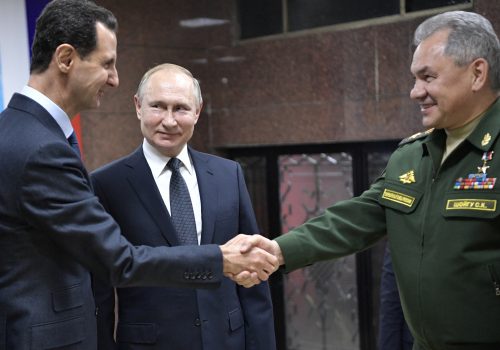March 16, 2021
The many paths to Syrian-Israeli reconciliation
A reported January meeting between several senior Syrian, Israeli, and Russian intelligence officers in Syria failed to advance bilateral discussions between the parties despite allegedly being attended by Bashar Al-Assad. This meeting—which took place at the Russian-owned and operated Khmeimim airbase—along with others, is a testament to the fact that communication has never ceased between Syria and Israel.
More recently, the Syrian regime has hinted that such activities were a top agenda item with officials like former Syrian Minister of Information Mehdi Dakhlallah discussing “the possibility of normalization with Israel” on state television. Such public pronouncements demonstrate Assad’s eagerness to keep pace with Russian influence in the region, particularly after Israel complained about Moscow’s failure to harness Iranian presence in Syria despite talks about the issue. The fact that Israel began to take matters into its own hands since the beginning of the civil war in 2011 meant that Russia’s goodwill would not only be called into question but significantly undermined.
During the 2008 Syrian-Israeli negotiations, which I participated as a consultant, Assad emphasized that he preferred an end to the constant state of war and not a peace treaty with Israel. At the time, the Israelis wanted to negotiate terms regarding Syria’s relationship with Lebanese militant group Hezbollah and Iran. Assad responded that Iran should be “the last file to be discussed.” At the same time, he explained that Lebanon’s issues were “just another matter.”
Returning to the present day, the lasting impression from the Khmeimim talks is that Syria must work toward “giving the impression” that it is willing to work with Russia. Considering the drastic changes in the last decade, what can each of the three parties—Syria, Israel, and Russia—do once they depart the negotiating table?
What Israel stands to gain
The Syrian army is no longer a military threat to Israel given its disarmament and almost complete collapse due to the decade-old civil war. What’s more likely is that Israel would like the Islamic Revolutionary Guard Corps’ (IRGC) presence removed entirely from Syria. With that in mind, what can Israel offer the Syrian state in return?
Israel withdrawing from the Golan Heights is a nonstarter in terms of their legal and political claims to the territory, especially with the United States recognizing its annexation under the Donald Trump administration. From my experience in past negotiations, I do not expect Israel to offer Syria much beyond allowing limited access to its citizens in the Golan Heights while not conceding any Israeli rights toward total sovereignty in the territory. As a concession, Israel may extend some humanitarian services it already provides to civilians residing in southern Syria.
In the event of a deal between Israel and Syria, Assad could ask Israel to help rehabilitate his reputation to establish himself as a sort of Francisco Franco in the Middle East. Should this not come to pass, Syria could ask Europe, once again, to finance the regime and quietly support an ongoing Russian presence in the country in doing so.
But does Israel have any interest in such an outcome?
For Israel, Iran’s presence in Syria has become as volatile as its nuclear threat. At the military level, pro-Iranian forces are deployed to 131 military bases and are supported through the coordinated effort of some 116 Hezbollah bases. Furthermore, entire Syrian military and security divisions are financed and under complete Iranian control, especially in areas adjacent to the Israeli border in the Golan Heights and along the Jordanian border. This in partly why Israel repeatedly conducts airstrikes against Iran-linked targets in Syria.
Another problem for Israel is the asymmetric threat of precision-guided missiles—some of which have already been delivered to Hezbollah by Iran via Syria. If ever used against Israel, the Iranian leadership could claim plausible deniability and avoid punishment.
However, even if Assad wanted to negotiate on Iran, the Syrian army is fractured and weak. Therefore, Assad is in no position to substitute or even confront the vitally needed and deeply rooted pro-Iranian forces in Syria.
What role does Russia play?
With that in mind, does Israel hope that Russia will help rid Syria of its Iranian presence? Assuming that Russia does want to do so, it cannot, with its current capabilities, achieve such an outcome without getting involved on the ground given its limited number of infantry troops, which is estimated to be less than four thousand.
The Iranian presence on the ground does not compensate for the lack of Syrian influence but cannot Russia replace it. The Kremlin understands that the Assad regime’s survival is contingent on the IRGC’s presence and its proxy groups and that any possibility of a Russian-Iranian clash means a renewed civil war as well as the end of the regime. In short, neither Russia nor the Syrian regime have the luxury of discussing Iran’s exit from Syria.
Israel would not be comfortable with such a precarious balance of force in Syria as Iran managed to build up a considerable arsenal of high precision missiles in the country, and thanks to a renewed Iranian role in the Levant. Israel is already exposed to such oscillations along its northern borders with Syria, as its major cities are at the mercy of Iranian missiles stored in arms depots and warehouses in Deir Ez-Zor province. Furthermore, Israel’s border with Lebanon is totally out of control due to Hezbollah’s presence in the south—and the balance of power in the Lebanon is, once again, a nonstarter.
Subsequently, and based on the current set of circumstances, Assad will not consider any guarantees provided by Russia’s Vladimir Putin or Israeli Prime Minister Benjamin Netanyahu as more credible than the assurances that British Prime Minister Tony Blair gave Libyan dictator Muammar Gaddafi.
Contrary to what observers might think and according to his entourage, Assad believes that he gave Putin the privilege and the ability to flex his muscles in the Eastern Mediterranean and the Red Sea. As a result, and despite there being a tie-up with Iran, it is a more vital and stable alliance.
For its part, Russia is not particularly fond of Assad. Russian diplomats have long said that Assad does not like Russia, especially since he prioritized visiting Britain in 2002 after coming to power a few years earlier. Assad only visited Moscow in 2008 after the assassination of Lebanese Prime Minister Rafik Hariri in 2005.
It is, thus, ironic that Russia is so invested in maintaining its instrumental role in Syria, which requires Iranian presence on the ground and Israeli jets in the sky. This presence restrains Turkey’s presence in Aleppo and Latakia province, where they support the Syrian opposition, and preserves its leverage in shaping the Syrian nation-state at the end of the crisis.
Russia’s strategy is to precariously walk a tightrope built upon alliances of necessity. To succeed, Russia needs to keep Iran, the US, Israel, Turkey, and the Syrian regime all in the same game. Russia is more than simply walking a tightrope—it is walking one that is increasingly fraying from both ends.
How the Biden administration can play a role
The Joe Biden administration can enjoy the unwieldy nature of many choices in dealing with Middle East peace when it comes to Syria. The most that came out the Khmeimim base meeting is another round of task distribution between Iran and Russia and a perpetuation of the conflict in Syria.
As mentioned before, Russia cannot convince or make Assad get rid of Iran. However, the peace and normalization agreements—with Israel, the United Arab Emirates, and Bahrain—which are to be followed by many other Arab countries, have opened new a perspective in the Middle East while simultaneously providing real opportunities for an alternative path for peace. This strategic turn allows the best alternative for deterring Iran and making proxy wars unsustainable by increasingly confronting the latter with direct deterrence. This will pave the way for a self-balancing progressive peace and security system that would facilitate better conditions for an American disengagement from direct involvement in the region. Such a peace and security system should certainly aim and encourage Iran to shift towards a prosperous and non-violent path.
There are numerous other possible scenarios for getting rid of the Iranian presence, like a significant military strike in Lebanon and Syria. A last possible scenario could occur in the event the Syrian regime implodes, which is an outcome that neither Iran nor Russia can address or protect against. Undoubtedly, President Biden is aware of those scenarios.
Samir Altaqi is a former advisor to Syria’s prime minister. He is also a nonresident fellow at the Middle East Institute in Washington.
Image: A couple take a selfie near a signpost pointing out distances to different cities, on Mount Bental, an observation post in the Israeli-occupied Golan Heights that overlooks the Syrian side of the Quneitra crossing, Israel January 21, 2019. REUTERS/Amir Cohen


